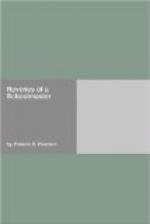“The world is too much with us;
late and soon,
Getting and spending, we lay waste our
powers;
Little we see in nature that is ours;
We have given our hearts away, a sordid
boon!
This sea that bares her bosom to the moon,
The winds that will be howling at all
hours
And are up-gather’d now like sleeping
flowers,
For this, for everything, we are out of
tune;
It moves us not. Great God!
I’d rather be
A pagan suckled in a creed out-worn—
So might I, standing on this pleasant
lea,
Have glimpses that would make me less
forlorn;
Have sight of Proteus rising from the
sea;
And hear old Triton blow his wreathed
horn.”
—Wordsworth.
I have heard many times that this is one of the best of Wordsworth’s many sonnets, and in the matter of sonnets, I find myself compelled to depend upon others for my opinions. I’m sorry that such is the case, for I’d rather not deal in second-hand judgments if I could help it. About the most this sonnet can do for me is to make me wonder what my world is. I suppose that the size of my world is the measure of myself, and that in my schoolmastering I am simply trying to enlarge the world of my pupils. I saw a gang-plough the other day that is drawn by a motor, and that set me to thinking of ploughs in general and their evolution; and, by tracing the plough backward, I saw that the original one must have been the forefinger of some cave-dweller.
When his forefinger got sore, he got a forked stick and used that instead; then he got a larger one and used both hands; then a still larger one, and used oxen as the motive power; and then he fitted handles to it, and other parts till he finally produced a plough. But the principle has not been changed, and the gang-plough is but a multifold forefinger. It is great fun to loose the tether of the mind and let it go racing along, in and out, till it runs to earth the original plough. Whether the solution is the correct one makes but little difference. If friend Brown cannot disprove my theory, I am on safe ground, and have my fun whether he accepts or rejects my findings.
This is one way of enlarging one’s world, I take it, and if this sort of thing is a part of the process of education, I am in favor of it, and wish I knew how to set my boys and girls going on such excursions. I wish I might have gone to school to Agassiz just to get my eyes opened. If I had, I’d probably assign to my pupils such subjects as the evolution of a snowflake, the travels of a sunbeam, the mechanism of a bird’s wing, the history of a dewdrop, the changes in a blade of grass, and the evolution of a grain of sand. If I could only take them away from books for a month or so, they’d probably be able to read the books to better advantage when they came back. I’d like to take them on a walking trip over the Alps and through rural England and Scotland for a few weeks.




